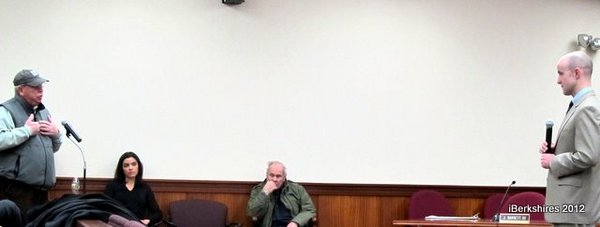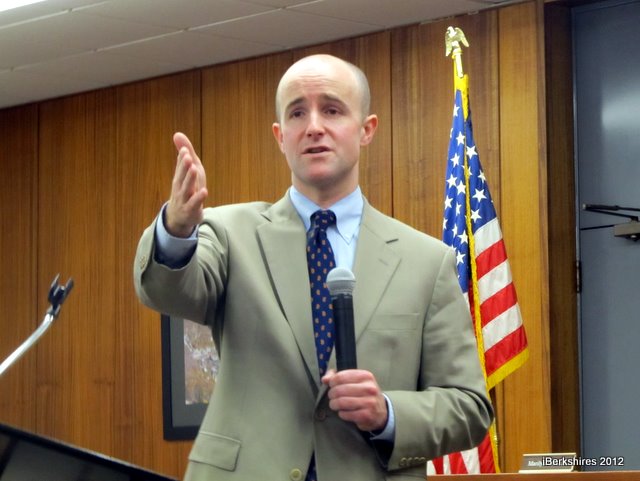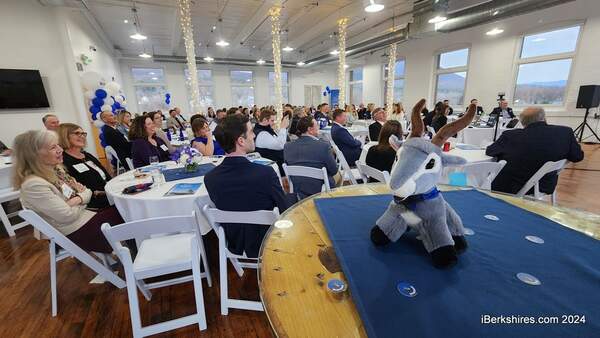
Senator Downing Hopes To Increase Local Aid
 Downing said he would like to see increases in both local aid and higher education as the budget process unfolds. |
Downing fielded questions on an array of topics at a "town hall" meeting with constituents at City Hall.
Right now, Beacon Hill's biggest priority is the state budget that has been proposed by Gov. Deval Patrick. The House of Representatives get first crack at it while the senators will take it up next month, he said.
With the way the budget is unfolding, Downing said aid to cities and towns will not be on the chopping block but instead be an area where he hopes to add more funding.
"I think at this point, the governor's numbers for Chapter 70 [education aid] and on unrestricted local aid is a starting point in both the Senate and the House, as in we expect them to be the baseline. We don't expect to go below them. I think we would all like to go above them," Downing said.
Downing said the Berkshire delegation will also be pushing for more funding for regional school transportation, also expected to be level funded. But that process is still in the Ways and Means Committee, which includes state Rep. Williams "Smitty" Pignatelli in the House and Downing in the Senate.
The governor's budget also includes a $10 million increase in the state's community colleges and a minor increase in the Board of Higher Education, which Downing said is another priority to add even more, too. The funding for the state universities are level.
"The level we fund public higher education at in Massachusetts is a disgrace," Downing said. "We are asking too much of our campuses and too much from our communities."
The state ranks near the bottom when it comes to higher education spending and every dollar that is not in the students' hands is adding to what they have to borrow — and not being spent in communities, Downing said.
Residents asked about the costs of books and possible reimbursements to cities and towns when colleges expand and take buildings off the tax rolls. Downing said going about it in a "whack-a-mole" way would not work. But increasing spending on higher education across the board will take care of those other issues, he said.
However, while the budget process motors along with hearings in both branches, the extent of what lawmakers can do depends on the federal government, Downing said. About a third of the budget is from the federal government and with that budget still unsettled politically, state officials need to be careful, he said. Additionally, a lot depends on the European economy because the state exports twice as much to Europe than any other state, he said.
While this may not be a "good budget year," Downing said the economy has "stabilized."
On conservation: While the state has focused on moving away from "dirty" energy sources, Downing said that conservation is part of the state's overall energy package. "We need to use less, use what we use smarter and get it from cleaner sources," he said. On WalMart's recent tax classification change: Downing wants the companies to let the towns know ahead of time if they are changing classification and if it means more money is going to the state, that money should go back to the towns. On a bill that makes slaughtering horses illegal: "The biggest challenge with Legislation that seems like a no-brainer is getting it to be a priority," Downing said. However, he has told the Joint Judiciary Committee, who is looking at the bill now, that he wants it to be passed. On term limits: While he has no firm position, Downing said ten years is about how long he thinks a state official should serve. On immigration: It's better handled by the federal government. |
The nearly two-hour meeting was filled with not only budget questions but discussion on specific bills, energy efficiency, campaign finance, hunger, Walmart and even wandered into immigration. Downing mostly listened to residents' concerns and asking for follow-up emails to take with him to Boston as the legislative session continues.
"The best ideas don't come from Beacon Hill, they come from listening," Downing said.
While the conversation was mostly tame, Downing did face some harsh criticism from Michael Chalifoux of Vietnam Veterans of America in regards to veterans benefits. With the ending of two wars, Chalifoux said the VVA is the only group stepping up to open outreach posts for returning soldiers while the state is not providing enough support.
Chalifoux took shots at Soldier On in Pittsfield, whose CEO is Downing's uncle, saying the organization is not providing the services that are needed. Soldier On works with the Department of Veterans Affairs and is focused on helping to homeless veterans get their lives back together by providing long-term housing, job training and counseling.
"You're either going to let these guys die and give that outreach money to your uncle at Soldier On, Jack Downing, or you're going to not," Chalifoux challenged. "Talking time is over Ben, you're either going to save these guys' lives or your going to let them die."
Chalifoux said Soldier On is not going to help the returning veterans because that is not the type of assistance they need right now nor will the veterans actively go there looking for help. He asked Downing to budget to put some people in the Berkshires for outreach posts.
"We know what to do. You have to have a person they will trust. They won't come into the VA, they won't come into City Hall, they won't even come into the Legion. You have to have people who will go out and find these guys," Chalifoux said.
Downing dismissed Chalifoux's allegations that he is pulling strings for his uncle by saying he has never taken action on anything regarding Soldier On and has filed all of the paperwork with the State House explaining his relationship to the organization. However, he did agree that there was a "difference in opinion" between he and Chalifoux and advocated for improving the services the state administers through the cities and towns.
"It is our solemn duty to make sure they are getting those services and I would never do anything to make it difficult to have those services," Downing said.















